
Helicopter String Quartet (screen title: Karlheinz Stockhausen: Helicopter String Quartet) is a 78-minute 1996 Dutch English- and German-language independent underground experimental documentary art film directed by Frank Scheffer.

Helicopter String Quartet (screen title: Karlheinz Stockhausen: Helicopter String Quartet) is a 78-minute 1996 Dutch English- and German-language independent underground experimental documentary art film directed by Frank Scheffer.

![Dutch Grasshoppers [nl] aerobatics team, flying the Alouette helicopters they used in the world premiere of the Helikopter-Streichquartett Alouette III Grasshoppers Ramstein 1984.jpg](http://upload.wikimedia.org/wikipedia/commons/thumb/b/bd/Alouette_III_Grasshoppers_Ramstein_1984.jpg/310px-Alouette_III_Grasshoppers_Ramstein_1984.jpg)
The film, produced by Ton van der Lee , documents the preparations and rehearsals in 1995 for the world-premiere performance by the Arditti Quartet of the 1993 composition Helikopter-Streichquartett (English: Helicopter String Quartet) by Karlheinz Stockhausen. This piece requires four separate helicopters (provided for the 1995 performances by the Royal Netherlands Air Force). Within it, each helicopter carries (in addition to the pilot) one member of a string quartet, a sound technician, television camera, video, and three-channel audio transmitters, and all flying through the air simultaneously. It was premiered at the Holland Festival. The film contains interviews with Stockhausen, the string players Garth Knox, Rohan de Saram, Irvine Arditti, and Graeme Jennings, and the pilots about the piece. [1] [2] [3] [4] [5] [6] [7] The film was premiered at the Chicago International Film Festival in October 1996, where it was nominated for several awards, was also screened at the Buenos Aires International Festival of Independent Cinema in April 2005, and was released on DVD by Medici.tv's label Medici Arts. [8]
Critic Ben Sachs wrote: "I'm a dunce when it comes to the music, but I found the movie fascinating, in part because the story has so much ready-made suspense. Any number of things could go wrong in the execution of the quartet, and it's entertaining to see how the composer and his crew respond to each problem that arises—it's something of an intellectual action movie". [9]
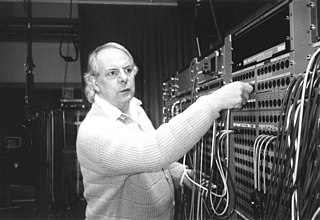
Karlheinz Stockhausen was a German composer, widely acknowledged by critics as one of the most important but also controversial composers of the 20th and early 21st centuries. He is known for his groundbreaking work in electronic music, having been called the "father of electronic music", for introducing controlled chance into serial composition, and for musical spatialization.
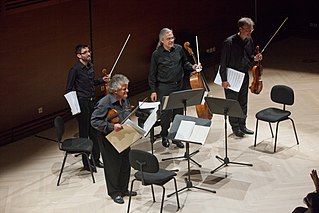
The Arditti Quartet is a string quartet founded in 1974 and led by the British violinist Irvine Arditti. The quartet is a globally recognized promoter of contemporary classical music and has a reputation for having a very wide repertoire. They first became known taking into their repertoire technically challenging pieces. Over the years, there have been personnel changes but Irvine Arditti is still at the helm, leading the group. The repertoire of the group is mostly music from the last 50 years with a strong emphasis on living composers. Their aim from the beginning has been to collaborate with composers during the rehearsal process. However, unlike some other groups, it is loyal to music of a classical vein and avoids cross-genre music. The Quartet has performed in major concert halls and cultural festivals all over the world and has the longest discography of any group of its type. In 1999, it won the Ernst von Siemens Music Prize for lifetime achievement, being the first and only group to date to receive this award.

Paul Dirmeikis is a French-speaking poet, composer, singer, and painter who lives in Brittany, France. He is of Lithuanian ancestry, and a member of the Lithuanian Composers Union.

The Holland Festival is the oldest and largest performing arts festival in the Netherlands. It takes place every June in Amsterdam. It comprises theatre, music, opera and modern dance. In recent years, multimedia, visual arts, film and architecture were added to the festival roster.
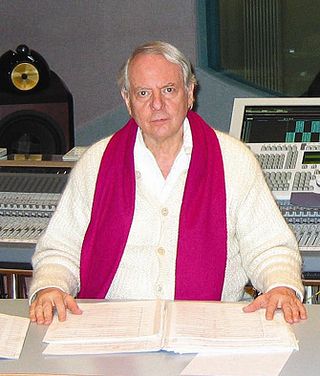
Licht (Light), subtitled "Die sieben Tage der Woche", is a cycle of seven operas composed by Karlheinz Stockhausen between 1977 and 2003. The composer described the work as an "eternal spiral" because "there is neither end nor beginning to the week." Licht consists of 29 hours of music.

The Helikopter-Streichquartett is one of Karlheinz Stockhausen's best-known pieces, and one of the most complex to perform. It involves a string quartet, four helicopters with pilots, as well as audio and video equipment and technicians. It was first performed and recorded in 1995. Although performable as a self-sufficient piece, it also forms the third scene of the opera Mittwoch aus Licht.
David C. Johnson was an American composer, flautist, and performer of live electronic music.
Carl Edward Vine, is an Australian composer of contemporary classical music.
Frank Scheffer is a Dutch director, cinematographer and producer of documentary film, mostly known for his work Conducting Mahler (1996) on the 1995 Mahler Festival in Amsterdam with Claudio Abbado, Riccardo Chailly, Riccardo Muti and Simon Rattle.
Robin John Maconie is a New Zealand composer, pianist, and writer.

Hilda Paredes is one of Mexico's leading contemporary composers, and has received many prestigious awards for her work. She currently resides in London, and is married to the noted English violinist, Irvine Arditti.
Stephen Cohn is an American composer of concert and film music living in Los Angeles, California. His compositional style embraces an expanded tonality with a 21st-century perspective.
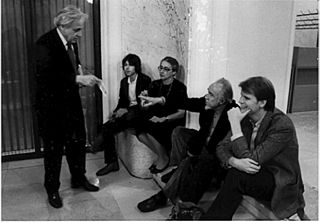
The International Society for Contemporary Music (ISCM) is a music organization that promotes contemporary classical music.
John McGuire is an American composer, pianist, organist, and music editor.

Garth Knox is a violist and composer who specializes in contemporary classical music and new music.
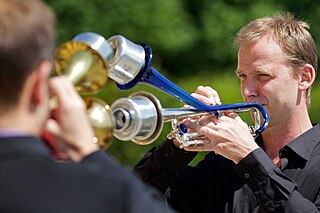
Marco Blaauw is a Dutch trumpet soloist known for his work in the field of new music and with Cologne-based contemporary music group Ensemble Musikfabrik. He plays a double bell trumpet, an invention that has allowed for numerous new compositions for trumpet, including those by Ernst von Siemens Music Prize winner, Rebecca Saunders. Blaauw is a consistent faculty member at the Darmstadt Summer Course, the Stockhausen Courses Kürten, the Lucerne Festival, and the Chosen Vale International Trumpet Seminar.

Klang —Die 24 Stunden des Tages is a cycle of compositions by Karlheinz Stockhausen, on which he worked from 2004 until his death in 2007. It was intended to consist of 24 chamber-music compositions, each representing one hour of the day, with a different colour systematically assigned to every hour. The cycle was unfinished when the composer died, so that the last three "hours" are lacking. The 21 completed pieces include solos, duos, trios, a septet, and Stockhausen's last entirely electronic composition, Cosmic Pulses. The fourth composition is a theatre piece for a solo percussionist, and there are also two auxiliary compositions which are not part of the main cycle. The completed works bear the work (opus) numbers 81–101.

Trans is a composition for orchestra and tape by the German composer Karlheinz Stockhausen, written in 1971. It is Number 35 in the composer's catalog of works.

Mittwoch aus Licht is an opera by Karlheinz Stockhausen in a greeting, four scenes, and a farewell. It was the sixth of seven to be composed for the opera cycle Licht: die sieben Tage der Woche, and the last to be staged. It was written between 1995 and 1997, and first staged in 2012.
Nicola Jürgensen is a German clarinetist and academic teacher. She played principal clarinet with the WDR Symphony Orchestra Cologne from 2001 to 2018, and has been professor of clarinet at Folkwang University of the Arts in Essen from 2018. She is active internationally as a soloist and chamber music player, and has made recordings. Besides the traditional repertoire, she is focused on contemporary music. She performed on stage in a production of Karlheinz Stockhausen's Michaels Reise um die Erde in Vienna and New York City, among others.